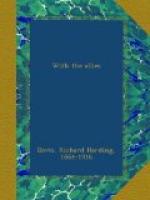At the Palace Hotel, which is the clearing-house for the social life of Brussels, we found everybody taking his ease at a little iron table on the sidewalk. It was night, but the city was as light as noonday— brilliant, elated, full of movement and color. For Liege was still held by the Belgians, and they believed that all along the line they were holding back the German army. It was no wonder they were jubilant. They had a right to be proud. They had been making history. In order to give them time to mobilize, the Allies had asked them for two days to delay the German invader. They had held him back for fifteen. As David went against Goliath, they had repulsed the German. And as yet there had been no reprisals, no destruction of cities, no murdering of non-combatants; war still was something glad and glorious.
The signs of it were the Boy Scouts, everywhere helping every one, carrying messages, guiding strangers, directing traffic; and Red Cross nurses and aviators from England, smart Belgian officers exclaiming bitterly over the delay in sending them forward, and private automobiles upon the enamelled sides of which the transport officer with a piece of chalk had scratched, “For His Majesty,” and piled the silk cushions high with ammunition. From table to table young girls passed jangling tiny tin milk-cans. They were supplicants, begging money for the wounded. There were so many of them and so often they made their rounds that, to protect you from themselves, if you subscribed a lump sum, you were exempt and were given a badge to prove you were immune.
Except for these signs of the times you would not have known Belgium was at war. The spirit of the people was undaunted. Into their daily lives the conflict had penetrated only like a burst of martial music. Rather than depressing, it inspired them. Wherever you ventured, you found them undismayed. And in those weeks during which events moved so swiftly that now they seem months in the past, we were as free as in our own “home town” to go where we chose.
For the war correspondent those were the happy days! Like every one else, from the proudest nobleman to the boy in wooden shoes, we were given a laissez-passer, which gave us permission to go anywhere; this with a passport was our only credential. Proper credentials to accompany the army in the field had been formerly refused me by the war officers of England, France, and Belgium. So in Brussels each morning I chartered an automobile and without credentials joined the first army that happened to be passing. Sometimes you stumbled upon an escarmouche, sometimes you fled from one, sometimes you drew blank. Over our early coffee we would study the morning papers and, as in the glad days of racing at home, from them try to dope out the winners. If we followed La Derniere Heure we would go to Namur; L’Etoile was strong for Tirlemont. Would we lose if we plunged on Wavre? Again, the favorite seemed to be Louvain.




